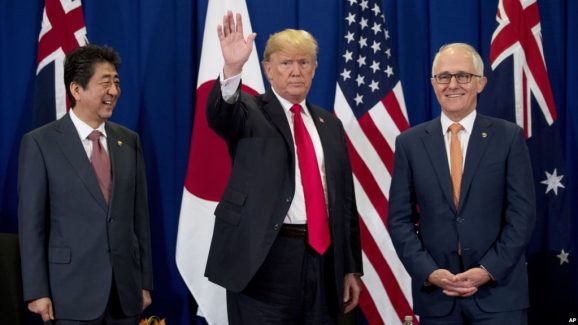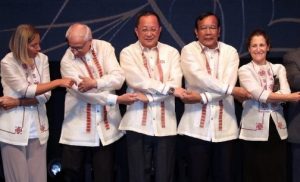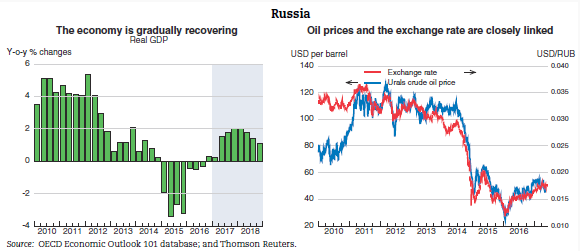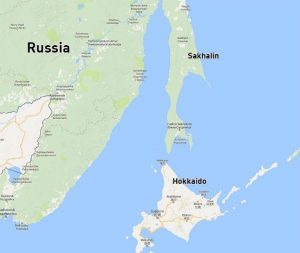Report from the Asian Summits: From Official US Alliance Media Scripts to New Perspectives for Change

Denis Bright invites comment on the significance of President Trump’s engagements with Asian leaders. Is it outrageous to suggest that travel has widened President Trump’s horizons in the traditions of overseas visits by the late President Nixon (1913-94) and his Secretary of State Henry Kissinger?
Voice of America Online (VOA) predictably emphasized the official US Department of Defense media scripts about importance of the strategic implications of regional contacts made by President Trump.
“Trump’s meeting with Australia’s Malcolm Turnbull and Japan’s Shinzo Abe underscored the growing relationship between the three nations in the face of regional security issues. The top concerns include North Korea’s nuclear weapons and ballistic missile programs and countering China’s increasingly assertive maritime territorial claims”.
This is a surprising construction of proceedings. Neither the Asia-Pacific Economic Cooperation Forum (APEC) nor the Association of South East Asian Nations Summit (ASEAN) is essentially for strategic discussions. In the case of ASEAN, the US, Japan and Australia are not full member states but peripheral dialogue partners.
The US as the Global Commercial Underdog?

Trading Economics Online 2017
The conventional assessment of the need for strategic solutions to international tensions coincides with pleas for sympathy from President Trump over the balance of payments problems faced by the US economy.
The US economy is indeed quite able to attract compensatory Net International Capital Flows to maintain a strong dollar and healthy, if over-valued, domestic and international financial markets. Enormous capital inflows into the US are invested by commercial banks in high yielding equities to extend the current global financial speculative bubble.
There is still considerable trickle down US investment into off-shore resources projects like the Arizona-based Freeport McMoRoran Inc (FCX) in Irian Jaya, Indonesia and similar investments in Papua New Guinea (PNG). PNG will host the next APEC Forum from 12-18 November 2018.
FCX’s high altitude mining sites on the slopes of ice-capped Puncak Jaya do not suggest that the US commercial banks are soft corporate investors.
Plagued by industrial unrest, social and environmental problems at the Grasberg mining sites, FCX has released half of its equities to the Indonesian Government. The future benefits will come from Indonesia’s assurances about a continuation of mining operations until 2041. Smelting activities will gain an added partnership with Mitsubishi Materials.
The plight of FCX’s miners and process workers at the Grasberg mine dispels any illusions about the perceived softness of US and other multinational capitalism across both parts of New Guinea (ABC News Online 11 August 2017: The Guardian Online 2 November 2016).
US Alliance as the Strategic Underdog in Asian Geopolitics?
In a return to Cold War rhetoric, VOA Online emphasized the strategic implications of President Trump’s visits.
More independently minded US strategic allies failed to join in the Cold War rhetoric and played a less intrusive role on the sidelines. New Zealand’s Prime Minister Jacinda Ardern and Canada’s Justin Trudeau brought fresh and more youthful perspectives to the ASEAN Summit as new-age leaders in contemporary globalization.
The McKinsey Global Institute Online in its highly readable recent papers relating to trends in globalization tells a similar story. Conventional voices from the Cold War Era are endangering regional security by seeking opportunistic competition with China and Russia.
Even President Trump seems to have learnt this wisdom from limited one on one encounters with regional leaders, including Xi Jinping and Vladimir Putin. Support for more subtle forms of diplomatic conflict resolution on the Korean Peninsula and the South China Sea has gained wider acceptance.
Endorsement of Regional Dialogue

Image from The New York Times
Ministerial representatives from key ASEAN Dialogue States negotiated with North Korean Foreign Minister Ri Yong-ho (Centre) and ministerial representatives from China, South Korea and Russia. The ASEAN regional foreign ministers regional forum called for the denuclearization of the Korean Peninsula.
“We reiterate our support for the complete, verifiable, and irreversible denuclearisation of the Korean Peninsula in a peaceful manner, call for the exercise of self-restraint, and underscore the importance of creating conditions conducive for dialogue to de-escalate tensions”.
Journalists Shawn Donnan and Katrina Manson of the Financial Times Online (FT) offered a fair assessment of President Trump’s forthcoming Asian visit. There was a logical anticipation that President Trump would stay close to predictable press releases that sought military solutions to Asian security problems in the South China Sea and especially on the Korean Peninsula.
“In a speech this month Mr Tillerson warned that countries were being seduced by cheap loans from China as part of its “Belt and Road Initiative” that would eventually lead to Beijing gaining sovereignty over important strategic economic assets in other countries (FT Online 31 October 2017).
This negative assessment of China has been modified discretely through more enthusiastic rapport between President Trump and President Xi Jinping.
Russia had also played its Far Eastern diplomatic card some weeks before President Trump’s Asian tour at the Eastern Economic Forum in Vladivostok, Russian Far East. It attracted 4,200 participants.
Russia’s Endorsement of Regional Dialogue
With its lack luster economy, Russia is the real net loser from international tensions in the great power league states. Real per capita growth levels are linked to trends in the prices of oil, gas and other resources. The current upward trends will assist the Russian economy.

The heavy burdens of defence spending and a less than internationalized banking sector are significant barriers to the growth and diversification of the Russian economy.
Diplomatic overtures to both Japan and South Korea do suggest Russian commitment to Far Eastern Sustainable Growth strategies. This is a miniature version of China’s Silk Road Transport ventures to link Asia with Europe. Both strategies evoke positive responses from France’s President Emmanuel Macron.
Protecting the EU from the negative effects of BREXIT is an important political goal for France. New continental ties with Russia, China, Saudi Arabia and perhaps Iran through commercial links to Russia and China are all logical strategies for a president with a youthful Napoleonic agenda.
The Xinhuanet photograph (L-R) captures dignitaries from South Korea, Russia, Mongolia and Japan at the plenary session of the third Eastern Economic Forum in Vladivostok. The Forum has brought political opposites together. The attendance of Japan’s Prime Minister Abe was a diplomatic coup.

Accord between Russia and Japan

Image from Google Maps
The following offer was made by Russia’s first Deputy Prime Minister Igor Shuvalov:
Russia would like Japan to consider the feasibility of building a road and rail bridge from Hokkaido to the south of Sakhalin Island.
“In this case, it will give us an additional opportunity to use our railway infrastructure, and Japan will become a continental state,” Mr Shuvalov said.
As a result of the visit by President Putin to Japan in December 2016, new initiatives in sustainable development and conflict resolution in the Kurile Islands off North Eastern Hokkaido were also considered:
Russia’s overtures to Japan include five joint investment projects in the Kurile Islands in aquaculture, greenhouse farming, tourism, wind power, and waste reduction on four islands which Japan sought to reclaim during the Cold War.
A humble catamaran ferry now plies the route from Wakkanai in Hokkaido to Korakov in Sakhalin across a distance of 43 kilometres (Hokkaido Sakhalin Passage Company Online).
Russian Overtures to the Korean Peninsula
While supporting UN sanctions against North Korea, Russia maintains appropriate relationships with both North and South Korea.
At the ASEAN Summit in Manila, the Russian Prime Minister Dmitry Medvedev proposed joint investment projects with South Korea and Japan. The Export-Import Bank of Korea together with the Far East Development Fund (FEFD) may invest up to $US 2 billion in projects in the Far East in the next three years (Tass Online 6 September 2017).
More significantly, there was a restatement in Manila on Russia’s commitment to a peaceful settlement of tensions on the Korean Peninsula:
“Just like South Korea, we are certainly interested in having peace on the Korean peninsula,” Medvedev said. South Korea (ROK) in Manila gave qualified support to the proposal.
The penny may have dropped for President Trump if travel does in fact widen horizons. Commercial and strategic power sharing may become the best diplomatic game in town within a more tolerant US Global Alliance that maintains a good working accord with a Continental Entente that is more commercial than militarized in its orientation.
Regrettably, for my kindly English teacher and LNP supporter who helped to steer our thoughts at Bremer SHS (1960-63), Britain is not a full participant in any forthcoming accord because of the BREXIT referendum. The conclusion presented takes me back to poetry lessons in senior high school courtesy of Alfred Lord Tennyson in Locksley Hall (1842):

 Denis Bright is a registered teacher and a member of the Media, Entertainment and Arts Alliance (MEAA). Denis has recent postgraduate qualifications in journalism, public policy and international relations. He is interested in promoting discussion to advance pragmatic public policies that are compatible with contemporary globalization.
Denis Bright is a registered teacher and a member of the Media, Entertainment and Arts Alliance (MEAA). Denis has recent postgraduate qualifications in journalism, public policy and international relations. He is interested in promoting discussion to advance pragmatic public policies that are compatible with contemporary globalization.









10 comments
Login here Register here-
Mia -
Lalnama -
Phil -
Stella -
Paul -
Pat -
Jim -
Patrick -
Michael -
Mia
Return to home pageThanks Denis for a look behind the scenes of the summit that I might not have seen .
It is good to see areas where countries can cooperate with each other rather than be constantly talking of war .
Excellent well researched article Denis. Such a huge area of world politics to be able to understand all,the nuances of the strategic dramas going on behind the scenes.
You so rightly state this forum was always meant to be about economic cooperation & development with our neighbours, amazing how agendas can be turned around
We live in hope of a peaceful world
Thanks for this extremely interesting perspective. Very encouraging to peek behind the barriers to see progress other than in hard militarist terms.
Thanks Denis for another interesting article on the dynamic world political situation highlighting the importance of international cooperation.
Great article Denis! It’s always interesting to see the dialogue outside of these conferences.
Let’s hope for a peaceful and collaborative 2018 and beyond!
Seems the Old American Allies has become a liability.
From Russia with love to the Region it seems! What a journey from Hokkaido to Europe even with existing slender transport links: Nice way to go, Denis
The Barnardi Right and One Nation want to change politics but their change is away from disarmament and towards more militarism.
Great insight Denis. thanks
Too much eyewitness news steers the electorate away from such changes , Michael. How many more military engagements will be required to teach Australians that the old order is changing, The USA is no longer in change of the Indo-Pacific so why are we always the predictable ally?